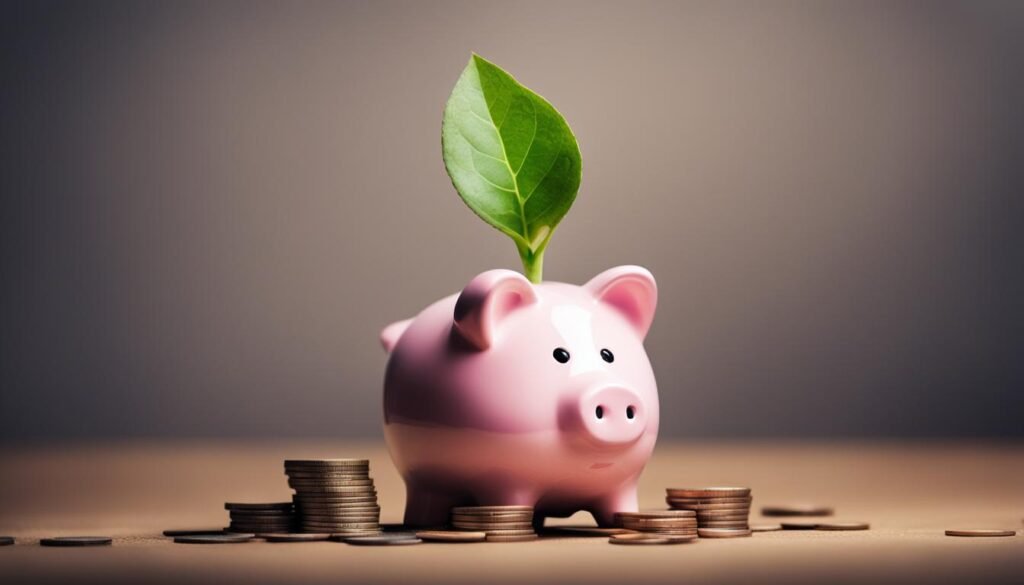How do you spend almost no money?
Are you tired of living paycheck to paycheck? Do you dream of a financially-free lifestyle? It’s time to embrace frugality and smart savings strategies. By making a few changes to your spending habits, you can start saving more and taking control of your financial future.
Key Takeaways:
- Embracing frugality can lead to a financially-free lifestyle.
- Implement smart savings strategies to maximize your savings potential.
- By spending almost no money, you can take control of your financial future.
- Make conscious choices and prioritize your financial goals.
- Believe in yourself and commit to achieving a financially-free lifestyle.
Time It Right for a No-Spend Month
Embarking on a month-long financial fast, also known as a “no-spend month,” requires careful planning and consideration. One of the crucial factors to keep in mind is timing. Choosing the right time to embark on a no-spend month can greatly increase your chances of success.
When considering the timing for your no-spend month, it’s important to avoid periods of heightened spending temptation. The holiday season, for example, is notorious for its abundance of sales and promotions, making it challenging to resist the urge to spend. Similarly, months with special events or birthdays may require additional expenditures, making it difficult to stick to your financial goals.
By selecting a time when there are fewer external factors tempting you to spend money, you can better focus on your financial fast. Look for a quiet month on your calendar, free from major holidays or personal celebrations. This will help create an environment that supports your commitment to not spending money on non-essential items.
Remember, a no-spend month is a personal challenge aimed at fostering financial discipline and saving money. By timing it right, you set yourself up for success and maximize the benefits of this transformative experience.
Establish Rules for Your No-Spend Month
When embarking on a financial fast or a no-spend month, it’s important to establish rules to guide your spending habits. By setting clear guidelines, you can stay on track and ensure that you are only spending on essential expenses. Here are some key steps to help you establish rules for your no-spend month:
1. Identify Non-Negotiable Expenses
Before your no-spend month begins, make a list of non-negotiable expenses. These are the essential expenses that you cannot avoid, such as rent, utilities, and insurance. These expenses should be prioritized and set aside as the first payments you make during the month.
2. Set Aside Cash for Essentials
While the goal of a no-spend month is to minimize spending as much as possible, there may still be essential items that you need to purchase, such as gas for your car or perishable foods. To avoid using your debit or credit card for these purchases, set aside cash specifically designated for these essentials. This way, you can ensure that you are sticking to your no-spend commitment while still attending to your basic needs.
3. Avoid Stockpiling Before the Fast
One common mistake people make before starting a no-spend month is stockpiling items in anticipation of the fast. However, this goes against the purpose of the fast, as it encourages unnecessary spending and defeats the goal of saving money. Instead of stockpiling, focus on using up what you already have in your pantry, fridge, and other supplies. This will help you reduce waste and make the most of what you already own.
By establishing clear rules for your no-spend month, you can effectively manage your finances and stay committed to your goal of saving money. Remember to identify your non-negotiable expenses, set aside cash for essential purchases, and avoid stockpiling items before the fast. These strategies will not only help you achieve your financial goals but also develop a better understanding of your spending habits and how to make more mindful choices in the future.

Plan Your Meals for a No-Spend Month
A crucial aspect of a successful financial fast is planning your meals and making the most of the food you already have in your inventory. By strategically using up your pantry and fridge items, you can not only save money but also reduce food waste. Here are some tips to help you plan your meals during a no-spend month:
1. Take stock of what you have:
Start by taking inventory of the ingredients you already have in your kitchen. Look through your pantry, fridge, and freezer and make note of the items that are nearing expiration. This will give you a clearer idea of what meals you can prepare using these ingredients.
2. Create a meal plan:
Once you have a good understanding of what you have available, create a meal plan for the duration of the no-spend month. Use the ingredients you already have as the basis for your meals. Look for recipes that utilize these ingredients and get creative with your cooking. This will help you avoid unnecessary trips to the grocery store and ensure that you’re using up what you already have.
3. Make use of staples and pantry essentials:
In addition to using up perishable items, consider incorporating staples and pantry essentials into your meal plan. Items like rice, pasta, beans, and canned goods can form the foundation of many budget-friendly meals. Look for recipes that utilize these ingredients and experiment with different flavors and cuisines.
| Meal Ideas | Ingredients |
|---|---|
| Veggie Stir-Fry | Frozen vegetables, soy sauce, rice |
| Bean Chili | Canned beans, diced tomatoes, spices |
| Pasta with Tomato Sauce | Pasta, canned tomato sauce, herbs |
| Vegetable Soup | Frozen vegetables, vegetable broth, spices |
By planning your meals and utilizing the ingredients you already have, you can make the most of your no-spend month and save money on groceries. Get creative with your cooking, experiment with new recipes, and enjoy the satisfaction of using up your inventory.
Go Public with Your No-Spend Goals
Embarking on a financial challenge like a no-spend month can be difficult, but one way to stay accountable and motivated is to go public with your goals. Sharing your commitment with friends and family not only helps you avoid temptations but also creates a support system to make the experience more enjoyable.
Instead of going out to restaurants or coffee shops, invite people over for potluck dinners. Not only does this save money, but it also encourages others to join your financial fast. Challenge your friends to participate in the no-spend month with you and see who can come up with the most creative and delicious meals using only ingredients they already have. This friendly competition can keep everyone motivated and engaged throughout the month.
In addition to potluck dinners, you can organize other no-spend activities together. Host game nights, movie marathons, or even DIY craft sessions. By finding alternative ways to have fun without spending money, you’ll not only save cash but also strengthen your relationships and create lasting memories.
“The journey to financial freedom is more enjoyable when you have others to share it with.”
Examples of Potluck Party Themes:
- International Cuisine: Each participant brings a dish from a different country.
- Pantry Challenge: Everyone brings a dish using only ingredients they already have in their pantry.
- Healthy Eating: Encourage each other to prepare nutritious meals using fresh ingredients.
- Recipe Swap: Share favorite recipes and try each other’s dishes.
| Potluck Party Ideas | Benefits |
|---|---|
| Collaborative Cooking | Discover new recipes and cooking techniques. |
| Budget-Friendly | Save money by sharing the cost of the meal. |
| Community Building | Strengthen relationships and bond with friends and family. |
| Support System | Motivate and encourage each other during the no-spend month. |
Going public with your no-spend goals not only adds an extra layer of accountability but also makes the journey more enjoyable. By organizing potluck parties and engaging in no-spend activities together, you’ll make lasting memories and develop a support system that keeps you committed to your financial goals.
Set Up Obstacles to Spending
During a no-spend month, it’s crucial to create barriers that make it harder for you to spend money on non-essential items. By implementing a few simple strategies, you can reinforce your commitment to the financial fast. Here are some effective ways to set up obstacles to spending:
- Opt-Out of Retail Emails: Unsubscribe from promotional emails sent by retailers. This will help reduce temptations and prevent you from being influenced by enticing offers and discounts.
- Disable Auto-Fills: In your web browser, disable the auto-fill feature that saves your credit card information on online shopping sites. This extra step will make it more cumbersome to complete purchases, giving you time to reconsider and resist impulse buying.
- Create a Tempting Websites List: Make a list of websites or online stores that often lead to unnecessary spending. Putting these websites in writing serves as a visual reminder to avoid visiting them during your financial fast.
By taking these steps, you’ll make it more challenging for yourself to give in to the urge to spend. Remember, the purpose of a no-spend month is to develop healthier money habits and break free from unnecessary expenses.

By embracing a no-spend month, you’re embracing a financially-mindful lifestyle. It’s an opportunity to reassess your relationship with money and find contentment in simplicity. Through the obstacles you set up, you’ll gradually shift your mindset and reduce the habit of mindless spending. Stay strong, be intentional, and savor the satisfaction that comes with overcoming financial challenges.
Have Fun During Your No-Spend Month
While participating in a no-spend month may seem like a challenge, it doesn’t mean you can’t have fun. In fact, there are plenty of free activities that can provide entertainment and enjoyment without breaking the bank. By exploring these options, you can make the most of your financial fast while still having a great time.
Free Things to Do
- Visit local museums, art galleries, or historical sites that offer free admission.
- Explore nearby parks and nature trails for hiking, biking, or picnicking.
- Organize a game night with friends or family, playing board games or card games you already own.
- Take advantage of community events and festivals that offer free entertainment and activities.
- Find free fitness classes or workout routines online to stay active without a gym membership.
- Attend free workshops or seminars in your area to learn new skills or hobbies.
- Borrow books, movies, or music from your local library to enjoy a variety of entertainment options.
Savings on Gas
During your no-spend month, take the opportunity to reduce your gas expenses by staying closer to home. Instead of driving long distances for entertainment, focus on activities in your local area. This not only saves money on transportation but also allows you to discover hidden gems in your own community.
Additionally, consider carpooling or using public transportation when necessary. By sharing rides or taking advantage of public transit options, you can further minimize your fuel costs and contribute to a greener environment.
Make the Most of Your No-Spend Month
Remember, a no-spend month is not just about saving money, but also about developing a greater appreciation for the things you already have. Use this time to engage in DIY projects, declutter and organize your living space, or pursue hobbies that don’t require additional expenses. By embracing creativity and resourcefulness, you can have a fulfilling and enjoyable month without spending a dime.
So, challenge yourself to find fun and free activities, explore your local community, and make lasting memories during your no-spend month.
| Activity | Description |
|---|---|
| Visit Local Museums | Explore art, history, and culture for free. |
| Enjoy Nature | Discover parks and nature trails for outdoor adventures. |
| Game Night | Have fun with friends and family by playing board games or card games. |
| Community Events | Attend free festivals and community gatherings for entertainment. |
| Home Workouts | Stay fit with free fitness classes or workout routines at home. |
| Workshops and Seminars | Learn new skills or explore interests through free workshops. |
| Borrow from the Library | Enjoy books, movies, and music without spending money. |

Focus On the Future to Stay Motivated
As I embarked on my no-spend month, I knew that staying motivated would be crucial to my success. I needed to keep my financial goals at the forefront of my mind and remind myself of the benefits that awaited me at the end of this journey. By focusing on the future, I was able to stay motivated and resist the temptation to spend.
One of the most effective ways to stay motivated during a no-spend month is to visualize the savings I would accumulate. I set specific financial goals for myself, such as paying off a credit card or saving for a vacation, and kept them in mind whenever I felt the urge to splurge. Seeing the progress I was making towards these goals gave me a sense of accomplishment and kept me motivated to continue.
In addition to visualizing my savings, I also kept a record of my progress throughout the month. I tracked every penny saved and every expense avoided. This record not only served as a reminder of my achievements but also allowed me to see how my savings were growing. It was incredibly motivating to see the numbers increase and reinforced my commitment to the no-spend month.
Table: Savings Record
| Week | Savings |
|---|---|
| Week 1 | $50 |
| Week 2 | $75 |
| Week 3 | $100 |
| Week 4 | $125 |
Lastly, I found it helpful to surround myself with reminders of my financial goals. I placed inspiring quotes and affirmations in prominent places around my home and workspace. These reminders served as positive reinforcement and helped me stay motivated even when faced with temptation.
By focusing on the future, tracking my progress, and surrounding myself with reminders, I was able to stay motivated throughout my no-spend month. It wasn’t always easy, but the sense of accomplishment and the progress I made towards my financial goals made it all worth it. If you’re considering a no-spend month, I encourage you to stay focused on the benefits that await you and keep your eyes on the prize.

Be Kind to Yourself During a No-Spend Month
Embarking on a no-spend month can be challenging both financially and emotionally. It’s important to understand that the act of spending is often driven by emotional gratification, and cutting it off completely takes practice. If you find yourself struggling during your no-spend month, it’s crucial to practice self-compassion and be kind to yourself.
Remember, the goal of a no-spend month is not to punish yourself or deprive yourself of joy. Rather, it’s about gaining control over your finances and developing healthier money habits. If you slip up and make a purchase that isn’t essential, don’t beat yourself up over it. Instead, acknowledge the slip-up, learn from it, and recommit to your no-spend goals.
“Practice self-compassion and be patient with yourself during your no-spend month journey. You’re taking a significant step towards financial well-being, and it’s okay to stumble along the way. Every small victory counts, and each day without unnecessary spending is progress towards your financial goals.”
If you find the concept of a month-long financial fast overwhelming, consider starting with shorter no-spend periods, such as a week or a few days. This can help you ease into the process and gradually develop the discipline needed for a full month. Remember to celebrate your achievements along the way and recognize that even small steps towards frugality can have a positive impact on your financial well-being.
Quotes:
“Practice self-compassion and be patient with yourself during your no-spend month journey. You’re taking a significant step towards financial well-being, and it’s okay to stumble along the way. Every small victory counts, and each day without unnecessary spending is progress towards your financial goals.”
– Financial Expert
Summary:
During a no-spend month, it’s important to practice self-compassion and be kind to yourself. Understand that spending is often driven by emotional gratification, and cutting it off completely takes practice. If you make a mistake, acknowledge it, learn from it, and recommit to your no-spend goals. Consider starting with shorter no-spend periods to ease into the process. Remember to celebrate your achievements and recognize that even small steps towards frugality can have a positive impact on your financial well-being.
Conclusion
Embarking on a no-spend month can be a game-changer for your finances and lifestyle. By embracing frugal living and committing to a financial fast, you can experience a multitude of benefits.
First and foremost, you’ll witness significant savings. By maximizing the use of what you already have, you’ll eliminate unnecessary expenses and free up more money to put towards your financial goals. Whether it’s paying down debt, saving for a dream vacation, or investing for the future, a no-spend month can turbocharge your progress.
But it’s not just about the financial gains. The sense of empowerment and self-discipline that comes from successfully completing a no-spend month is invaluable. You’ll develop healthier money habits, gain a fresh perspective on spending, and learn to prioritize what truly matters to you.
Furthermore, a no-spend month encourages creativity and resourcefulness. Rather than relying on external sources of entertainment, you’ll discover free activities, explore your local community, and tap into your own skills and interests. Frugal living fosters a sense of gratitude and contentment, as you learn to appreciate the simple pleasures in life.
FAQ
How do you spend almost no money?
By embarking on a no-spend month and following smart savings strategies.
How do you time a no-spend month right?
Avoid the holiday season and months with special events or birthdays.
What are non-negotiable expenses during a no-spend month?
Rent, utilities, and insurance should be considered non-negotiable.
How can you plan your meals for a no-spend month?
Use up the food you already have and plan your meals around what’s left.
How can you share your no-spend goals with others?
Share your goals with friends and family to avoid temptations, and invite them over for potluck dinners to challenge them to join your financial fast.
How can you make it harder to spend during a no-spend month?
Unsubscribe from retail emails and disable credit card auto-fills on online shopping sites.
What are some fun activities you can do during a no-spend month?
Look for free activities near home, borrow books from the library, or work on DIY projects.
How can you stay motivated during a no-spend month?
Remind yourself of your financial goals and keep a record of your savings.
How should you approach a no-spend month if you find it difficult?
Practice self-compassion and commit to trying again in the future or start with shorter no-spend weeks or days.
What are the benefits of a no-spend month?
Frugal living and a financially-free lifestyle are some of the benefits of a financial fast.






